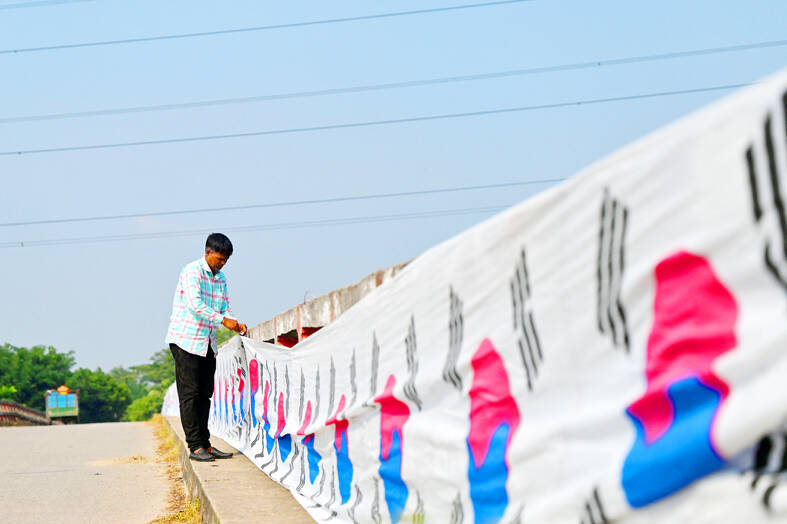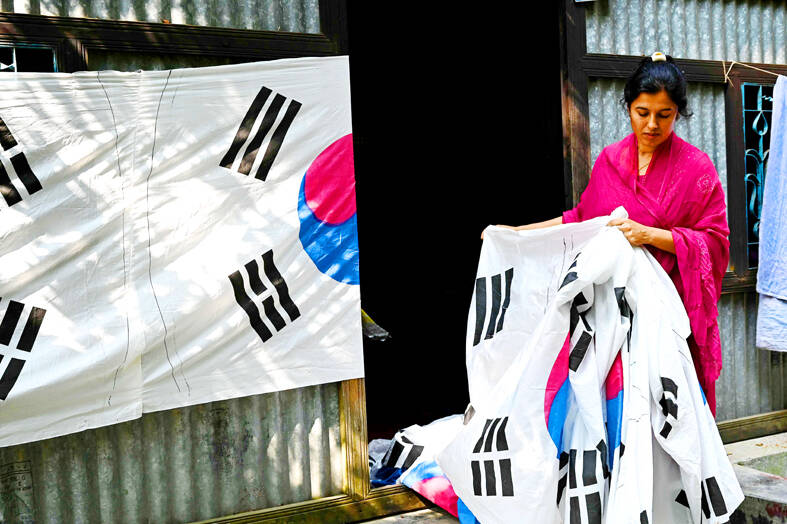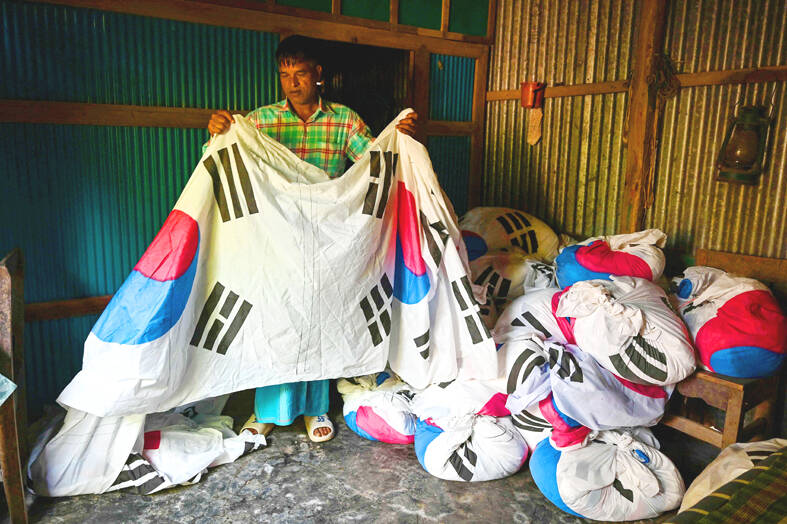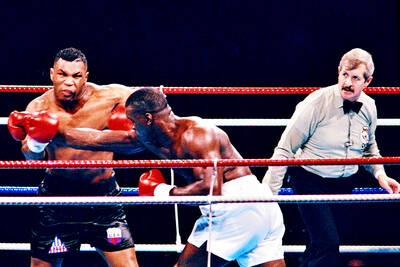Bangladeshi chemist Abu Kowsir said South Korea gave his family prosperity — so the least he can do is cheer on his benefactors when they begin their World Cup campaign this week.
He and his wife, Sabina Kowsir, have amused and confused their neighbors by stitching together South Korean flags into a 3.5km long banner that weaves a path from their home, along nearby streets and over a river into a neighboring village.
The extravagant tribute cost them US$5,000 and testifies to Abu Kowsir’s love of a country where he spent much of his adult life as a migrant worker.

Photo: AFP
“We love South Korea and this is how we chose to support the team,” Sabina Kowsir, 34, said. “We will keep supporting them and will pray for their victory.”
Sabina Kowsir has never been to the country where her husband toiled in factories for 15 years, but was intoxicated by the “great tales” he brought home from his time in the industrial giant.
“Whenever my husband came home from South Korea, he would tell me about the culture, discipline and beauty of the country,” she said. “I truly loved those stories. I consider South Korea my dream place to visit.”

Photo: AFP
In the South Korean factory where he worked, Abu Kowsir was responsible for scraping components out of used handsets and other consumer goods, melting down gold and preparing it for resale.
The long stretch abroad gave Abu Kowsir, 45, the resources to start his own jewelry business at home and he credits his labor there for helping propel his family into the country’s middle classes.
He first set his allegiance after watching the 2002 World Cup, jointly hosted by South Korea and Japan, where he was awed by the feats of star midfielder Yoon Jong-hwan.

Photo: AFP
“Jong-hwan was my favorite player, he was brilliant,” Abu Kowsir said at his home.
He said it took tailors two weeks to sew the banner, which was partially bankrolled by his decision to sell a mango orchard he inherited from his father.
Its unfurling has caused a local stir on social media, with thousands of people visiting to catch a glimpse of it in person — even if they do not quite understand the reasoning behind the costly endeavor.
“They are crazy, spending so much money just to show their love for their team,” neighbor Mohammad Akash said. “People are coming to our village from all over just to see.”
Bangladesh is better known for its love of cricket, with its soccer team ranked 192nd globally and never qualifying for the premier international tournament. Every four years, the World Cup still arouses feverish passions in the South Asian nation, where powerhouses Brazil and Argentina have a huge following.
Some die-hard supporters spend fortunes painting their homes in the national colors of their teams.
The ostentatious rivalry has occasionally turned violent. During the last Cup in 2018, rival followers of Lionel Messi and Neymar clashed with machetes in the central town of Bandar, leaving two people critically wounded.
South Korea, ranked 28th, faces an uphill battle against Uruguay when its campaign begins on Thursday, and the daunting prospect of a showdown with Portugal later in the group stage.
Abu Kowsir said he has been gently ribbed by neighbors about his side’s dim prospects while drinking at a local tea stall, but he remains philosophical.
“There’s victory and defeat in every game,” he said. “As a Korean supporter, I hope they will play well. Even if they cannot reach the final, I will still support them.”

OUT AGAINST INDONESIA: Taiwan reached the semi-finals at the tournament for the first time by defeating Denmark, with Chou Tien-chen beating Viktor Axelsen Taiwan yesterday crashed out of the Thomas Cup team competition in Chengdu, China, but achieved their best result at the top-tier badminton event by reaching the semi-finals. Indonesia were too good in the semis, winning 3-0 to advance to today’s final against China, who eliminated Malaysia 3-1. In the opening singles of the men’s team clash at the Hi-Tech Zone Sports Center Gymnasium 2, Anthony Ginting defeated Taiwan’s Chou Tien-chen 21-18, 21-19 in 51 minutes, which put a huge hole in Taiwan’s aspirations to perhaps even make the final. In the men’s doubles, Fajar Alfian and Muhammad Ardianto downed Lee Yang and Wang

Rafael Nadal on Tuesday lost in straight sets to 31st-ranked Jiri Lehecka in the fourth round at the Madrid Open, while Taiwan’s Hsieh Su-wei advanced to the semi-finals in the women’s doubles. Nadal said that he was feeling good about his progress following his latest injury layoff. Nadal called it a “positive week” in every way and said his body held up well. “I was able to play four matches, a couple of tough matches,” Nadal said. “So very positive, winning three matches, playing four matches at the high level of tennis. I enjoyed a lot playing at home. I leave here with

When 42-1 underdog James ‘Buster’ Douglas shocked ‘Iron’ Mike Tyson 34 years ago at the Tokyo Dome, the result reverberated worldwide. Spectators at the 45,000-plus seater venue witnessed one of boxing’s biggest upsets as unbeaten heavyweight champion Tyson was knocked out in the 10th round by the unheralded Douglas in February 1990. Boxing returns to the famous venue on Monday for the first time since that unforgettable encounter when Japan’s undisputed super-bantamweight world champion Naoya ‘Monster’ Inoue puts his belts on the line against Mexican Luis Nery. The 31-year-old Inoue (26-0, 23 KOs) is a huge star in Japan and is just

Top-ranked Iga Swiatek on Saturday came through “the most intense and crazy final” she has ever contested to avenge her loss to Aryna Sabalenka in last year’s Madrid Open final with a grueling three hour, 11 minute victory in the Spanish capital. Coming back from 1-3 down in the decider and saving three match points in total, Swiatek claimed a 7-5, 4-6, 7-6 (9/7) victory to secure the Madrid Open trophy for the first time. “Well, who is going to say now that women’s tennis is boring, right?” Swiatek said. Swiatek, who picked up the 20th title of her career, and ninth at